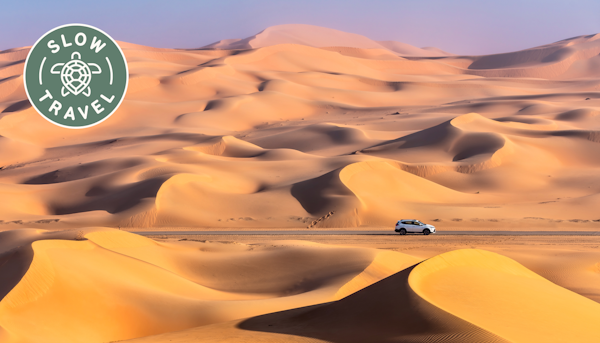After years of living in the Middle East, writer Jenny Walker recently set off on move back to Europe, driving the whole way. Here’s why.
Sitting at a table overlooking the Red Sea, a be-thobe-d Saudi gentleman sat sipping a latte and toying with his full English breakfast (minus the pork products).
Apparently entirely at ease with his five-star surroundings, he nonetheless revealed his relative newness to luxury by his shoes – not to mention the Bedouin songs playing audibly on his phone, which didn’t quite harmonize with the hotel’s Kenny G–esque soundtrack. Every now and then, in time with the mix of melodies, our neighbor bent down to stroke his new sneakers, as if the shoes were living extensions of his legs.
At length, and with a surreptitious glance towards the waiter, he slid them off and sat cross-legged on the seat. Apparently now more comfortable, he gave up on the chicken sausage and tucked into the local bread and honey instead. Breakfast done, he unfolded his napkin, blew into it with enough gusto that it rattled the teacup, and folded it up neatly on top of the discarded sausage. It was at that moment that he caught my eye. Wholly unacceptably given the circumstances – I was sitting with my husband – the gentleman and I shared a smile.
To the degree that one can really know anything of another person or another culture, I think I know what that smile meant. It was a moment of sensed connection. I was sitting demurely in my seat, playing the same game: twitching at my abaya (the one I wasn’t sure I even needed to wear), adjusting a scarf that kept falling into the fuul medames and pretending I knew exactly which combination of condiments to use to garnish the dish. We were visiting, in other words, each other’s world, seeing how we fit in – and editing out the parts that didn’t quite suit us.

The long way home
And that’s where husband, Sam, and I have been these past two weeks: crossing borders of both an imaginary and literal kind on our overland journey between Muscat and a very small hamlet above the clouds in northern Spain. If you’re wondering why we didn’t just get on a plane, I’d like to tell you it was because of genuine concern for climate change – but that would be a tad disingenuous. After all, our wadi dog Gertie (named after the Arabist Gertrude Bell but lacking her namesake’s inclination for overland travel), is making the trip in style, by plane – offsetting any small good occasioned by our choice of transport.

The real reason for an 8000km (4970-mile) road trip in a 15-year-old Ford Expedition is our joint inability to leave the Middle East on a Friday and wake up in Europe on a Saturday. After all, how do you say goodbye to the region that has been home for happy decades, and to the country in which we first met? How do you show how much you love the friends you made there, and the gratitude for many years of professional opportunities and rewarding employment? How do you let the desert go when it has crept into your soul?
As Wilfred Thesiger famously predicted: “This cruel land casts a spell.”
Epic journey, minimal planning

We never managed to answer those questions. And so we continued watering the garden of our house in Muscat until the packers reeled up the hose and rolled up the carpets. At the eleventh hour, we shifted the contents of the freezer into an insulated container, pulled out the camping gear from an itemized box on the shipping manifest, said “yes” to a commission from Lonely Planet to contribute to the new edition of its Egypt guide – and drove away as if we were on one of our regular camping jaunts. Regular, that is, except for the addition of a hippo-shaped door wedge, 32 empty food containers and a half-jar of marmite that we didn’t have the heart to throw out after the packers had left.
This is no way to set out on an epic journey. And I should know: I’m the co-author (with sam) of an off-road guide to Oman, and my 20 years of experience as a writer and educator have taught me the value of planning. Yet sometimes, you just have to go.

So here we are – two weeks, many adventures and 4000km (2485 miles) later, with two fewer food containers and two more quilted bishts than when we set off, camping through freezing desert nights on our circuitous route across the Middle East. (We won’t dwell on our occasional stay at a luxury hotel.)
A little help from my friends
We can’t claim to have come this far on our own. We’ve been helped by many strangers, including border guards and camel herders. We’ve been kept alive with dates, tahini and homemade halva from our lovely friends in Muscat (one good way to use our surplus of lock-and-lock containers). And I couldn’t do it without Sam, who has quietly been masterminding shippers, vehicle maintenance and insurance for the safety of our trip as I bemoan the lack of a stove.

All of which is to say: we have yet to make our full farewells. We both have the sense that when we run out of dates and halva, we’ll turn around and slip back home to Muscat. We know we must cross our mental borders soon, turn our faces into the wind and embrace the excitement of a new life in Spain.
We’re looking forward to reuniting Gertie when we eventually pass through Milan. But for the moment, we feel lucky to have this last chance to listen to the desert lark and scent the camels upwind.
